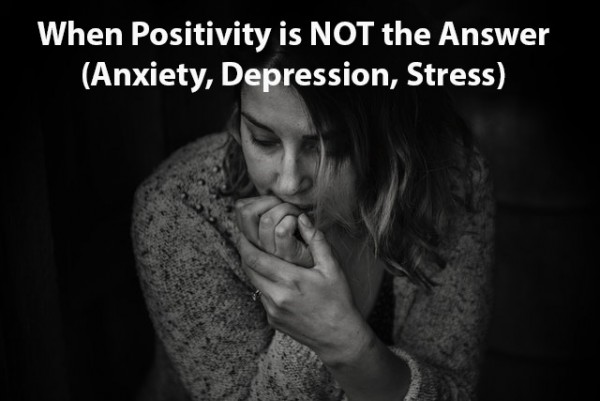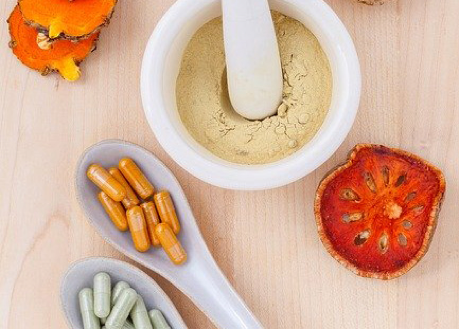When Positivity is NOT the Answer (Anxiety, Depression, Stress)
By: Jena Ann
Are you or have you struggled with chronic anxiety, chronic depression, or chronic stress and someone told you to just be more positive?
Annoying right?
 A positive mindset doesn't always work. Positivity is sometimes not the answer when dealing with chronic anxiety, depression, and even stress.
A positive mindset doesn't always work. Positivity is sometimes not the answer when dealing with chronic anxiety, depression, and even stress.
It is extremely difficult being chronically sick and not knowing when you might experience another pain flare-up, or dealing with a mental health battle where sometimes everything is great, and other times everything feels out of control, and you just feel broken inside and you don’t understand why. You try and tell yourself positive things, but nothing ever seems to work. Maybe you were a really positive person in the past, but you just can’t seem to get back there. I know personally how it feels to be depressed to the point where everything that used to make you happy no longer even brings a smile to your face.
In my last blog post, 36 Ways to Kill Negativity Dealing with Chronic Illness, I provided many great ways for improving positivity, avoiding going to a negative place, and climbing out of that negative place. But, positivity is not always the answer, and here is why!
Understanding Your Type of Anxiety, Depression, or Chronic Stress
What depression, anxiety, and stress all have in common is they can be classified into two types. There is the kind that exists because your mental thoughts cause it. This could be due to situations such as chronic illness, death, job loss, financial struggles, difficult relationships, trauma, etc. It is possible for this type to be improved with positivity, stress management, talking to a counselor, lifestyle, or other healthy changes. Then, there is the stress, anxiety, and depression that is present in your body and is due to some actual ongoing physical (chemical) imbalance.
You might be struggling from both a mental and internal physical battle making chronic stress, anxiety or depression even more difficult to conquer. Often with an internal physical battle, there is likely not a psychological reason for your stress, depression, or anxiety. There might be a reason, or the reason may no longer be present. No positive thinking is going to help if the problem is purely physical instead of mental.
A Bandage Fix VS. An Actual Fix
 I have read what feels like hundreds of articles on ways to deal with anxiety, depression, and stress. It is awesome that there are so many options out there. However, many are just bandage fixes. They don’t stop the anxiety, stress, or depression from coming back. Trying challenging thoughts, grounding, positive affirmations, or journaling might provide temporary relief, but not a long-term fix.
I have read what feels like hundreds of articles on ways to deal with anxiety, depression, and stress. It is awesome that there are so many options out there. However, many are just bandage fixes. They don’t stop the anxiety, stress, or depression from coming back. Trying challenging thoughts, grounding, positive affirmations, or journaling might provide temporary relief, but not a long-term fix.
If you feel like you are facing a physical internal battle you have to look at solutions that are more physical vs. mental. Physical solutions could be diet, sleep, essential oils, exercise. However, for many people, those things might not make a huge difference. So in addition, there are many alternative treatments that could help. Some form of therapy is very beneficial if you are dealing with complicated health issues. Specifically, integrative psychiatry helps to address health issues that are both mental and physical. Lastly, there are a lot of great supplements/herbs to help (which has made a difference for me)!
Dr. Axe provides some great information on supplements and natural remedies for anxiety, depression, and stress.
Anxiety Natural Remedies: 15 Ways to Relax & Find Calm
13 Natural Remedies for Depression: Find Hope Again!
7 Adaptogenic Herbs or Adaptogens that Help Reduce Stress
WARNING: Not All Supplements Are Created Equal
If you want to try any new supplements, make sure you review our supplement content for some help on how to purchase effective ones. There is a difference between the supplements you buy in the grocery store and the supplements you buy at a health food store.
Supplements are not FDA-approved. Many are artificial and could be potentially unsafe causing more problems vs. solutions. In addition, not every herb is right for your body. You could visit a naturopath who does muscle testing, or an Ayurveda doctor. They can choose supplements based on your body’s energies. The right doctor can help find the herb that your body will respond the best to. Make sure you check with a doctor before starting any new supplements.
These Conclusions Are Based on My Own Personal Experience with Stress/Anxiety and Depression
Fixing My Chronic Stress/Anxiety
In my experience of being stressed/anxious with my cortisol levels elevated, the best way to reduce them is through an adaptogen herb. I have used an adaptogen herb on multiple occasions for managing my stress. Dealing with chronic illness, I’ve had many situations where I couldn’t just fight off my stress through healthy mental thoughts. I have become a pretty positive person. But, I’ve had times of chronic stress where I couldn’t get back to my positive place, and it just felt impossible.
Just last month, I was stressed and I had a list of reasons why, and writing a blog post on positivity actually helped me out. But recently, I noticed my stress and anxiousness was beyond a simple change in thinking. The cause of my chronic pain was also causing me stress on a physical level. Something was off chemically in my body. No matter how bad the pain flare, the mental battle of dealing with it was almost worse than the actual pain itself.
My stress was making it hard to sleep, but I wasn’t even having too many stressful thoughts. I just felt this anxiety that I couldn’t seem to shake off. I was worried about being in pain, about when the pain would go away, and if it would get worse, and I just couldn’t shake it off. When I visited my naturopath doctor for the pain, I made a point to ask for a supplement to help with my stress (picked specifically for me with the use of muscle testing), and it has definitely made a difference. In addition, the pain has improved, as well.
It can be hard to know what your body is asking for. This is something I have not yet excelled at, and I get frustrated with myself for not being better at it. Often when something is really wrong, I assume the wrong thing first, and I may confuse or ignore symptoms. It can sometimes take a week or more before I realize I can’t just fix it on my own. This is difficult for me, I always want a simple solution.
Fixing My Chronic Depression
 I have also found supplements to be the best solution for dealing with my seasonal depression. A few years ago, it helped not only with my seasonal depression but with my chronic depression from being chronically sick, as well. For many years, my seasonal depression felt almost like a mental health battle.
I have also found supplements to be the best solution for dealing with my seasonal depression. A few years ago, it helped not only with my seasonal depression but with my chronic depression from being chronically sick, as well. For many years, my seasonal depression felt almost like a mental health battle.
Seasonal depression made me less interested in all the things I normally enjoyed and made me not want to do chores, work, or anything. But, no matter what I did to help with my mental health the depression was still there.
Once I was given a supplement (picked specifically for me with the use of muscle testing) to take ongoing during the winter months, I noticed a change almost immediately. With my supplement, I didn’t wake up depressed, or look outside see the snow and instantly want to cry. The darkness coming earlier took away my desire to watch TV from darkness till bedtime. My depression was gone, without changing my mental outlook or changing my dislike for wintertime.
This didn't mean I was all of a sudden positive and happy. I still had times of anger, sadness, and general unhappiness dealing with my chronic pain, but it was no longer feelings of absolute hopelessness in the form of depression. With the depression gone, I couldn't actually work on positivity.
Treatments for Managing Chronic Illness
There are so many ideas on how to deal with mental health battles, but it is rather challenging to know what path to take. For some, the mental health battle is not going to disappear without improving chronic illness. We have researched and wrote about many treatments, so take a look at our Chronic Pain Treatments content to see if there is a treatment that might help you.
<<-- Back to Renewed Living Blog Email to a friend
